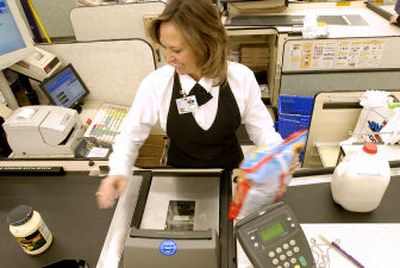In surprise action, Idaho Senate votes to repeal state’s 6% tax on groceries

BOISE – In a showdown on the floor of the Idaho Senate, backers of removing the state’s 6 percent sales tax from groceries successfully held off a series of amendments proposed by the Senate’s top GOP leader.
“This is a matter of equity. I think it’s a matter of fairness,” said Sen. Cliff Bayer, R-Boise, who led the grocery-tax repeal effort – and earlier announced that he had 48 co-sponsors among Idaho’s 105 legislators. “Its timing is right. It has support.”
Backers of the grocery-tax repeal had been unable to even get a hearing for their bill in the House Revenue and Taxation Committee, as House GOP leaders favored income tax cuts instead.
Sen. Shawn Keough, R-Sandpoint, voted in favor of the grocery tax repeal, though she said it was tough to vote against her party leadership.
“I have voted since the day I got here to take the sales tax off of food,” Keough said. “It just seems so wrong to tax the basic necessities of life.”
All six minority Senate Democrats sided with 14 Senate Republicans in the unrecorded vote to back the amendment.
“That’s what the process is supposed to look like – bipartisan support, being clear on what you believe, and standing up,” said Senate Assistant Minority Leader Cherie Buckner-Webb, D-Boise. “I couldn’t be more proud of our body today.”
Sen. Steve Vick, R-Dalton Gardens, was Bayer’s co-sponsor for the amendment. “It’s something that I’ve worked on for a number of years, and we’ve never been able to get a hearing on the bill,” he said.
The new bill would launch a two-year phase-out of Idaho’s current $100-per-person annual grocery tax credit, which Idahoans claim on their income tax returns each year, to be replaced by the removal of the sales tax from food.
Thirty-seven states, including Washington, don’t charge sales tax on groceries.
“I am sensitive to those communities along the borders with states that have lower or no sales tax than the state of Idaho,” said Sen. Jeff Siddoway, R-Terreton. “But you know, senators, this is just another exemption. And it further complicates our system. If we keep giving these exemptions over and over, pretty soon we’re going to have a 7 percent sales tax.”
He also argued that businesses don’t care about the sales tax on groceries, but Bayer disputed that.
“Businesses do care about this – from the small, ma-and-pa grocery stores that have closed in places like Fruitland, to the larger-format stores that point to this issue (when they decide) … which side of the river they locate on,” Bayer told the Senate. “It’s a big business factor. This is not just another exemption. This is trading a credit, with some bridge money, for an exemption.”
He added, “You’re taking a credit off the books. You’re simplifying the income tax form, including tens of thousands of forms that go in just for this credit.”
The move destroys a compromise on tax cuts that had been emerging between the House and the Senate. While the House had passed a $51.2 million-a-year income tax cut – cutting the top personal and corporate income tax rates from 7.4 percent to 7.2 percent and also exempting the first $750 in taxable income, permanently – Senate President Pro Tem Brent Hill, R-Rexburg, had favored trimming that back to a one-tenth of a percent rate cut in all of Idaho’s income tax brackets, dropping the top rates from 7.4 percent to 7.3 percent. That would have reduced the tax cut bill’s cost to the state general fund to $27.9 million a year.
The grocery tax repeal bill will cost the state $18.6 million to the general fund next year, fiscal year 2018, and $26.1 million in the second year of the two-year phaseout, fiscal year 2019. While the sales tax on groceries collects much more than that, most of the cost would be covered by removing the existing grocery tax credit.
The new version of the bill still needs passage as amended in the Senate, concurrence in the House to the Senate amendments, and the governor’s signature to become law. It marks a big turn in direction for Idaho lawmakers just one week before they planned to adjourn this year’s session.